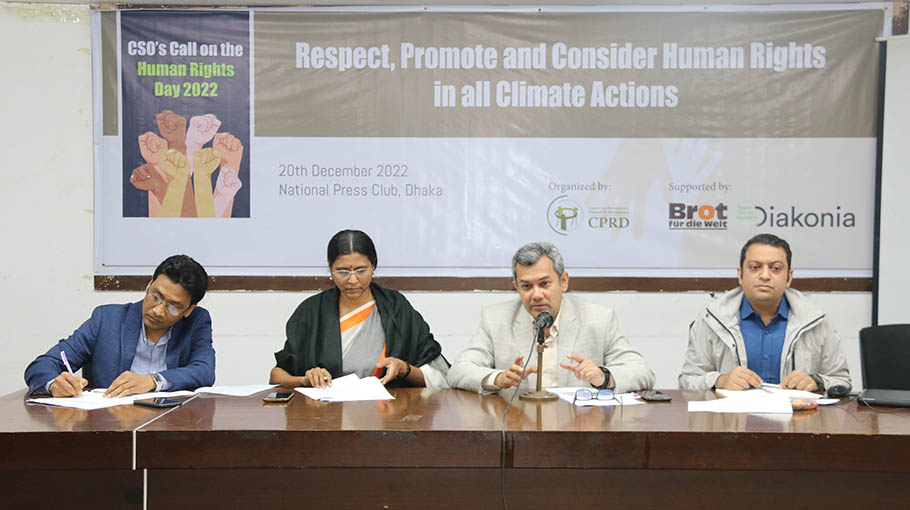Climate-vulnerable communities
Huge challenges of human rights ahead

Climate changes are greatly affecting human rights to climate vulnerable communities. National and international policies are needed to protect the human rights of affected people who especially face food and shelter insecurity. Otherwise, it will be a great disaster in future.
Speaker on Tuesday made such observations while speaking at an event titled, “CSO’s Call on Human Rights Day 2022: Respect, Promote and Consider Human Rights in all Climate Actions” held at the National Press Club in the capital organized by Center for Participatory Research and Development- CPRD.
MdShamsuddoha, CEO of CPRD said, “We have conducted a number of researches and investigations, where it reveals that climate change is creating obstacles in getting the right to food, water, clothing, shelter, medical care and education for the people affected by climate change. The human rights of women who are financially weak or physically challenged are the mostly affected.”
“The issue of human rights violations as a result of the impact of climate change was also seriously presented in the special report of the United Nations organ UN-HCHR in 2009. Even though climate-vulnerable populations migrate to vulnerable areas, especially urban areas, they are exposed to different types of risks such as food insecurity, health risks and problems in accessing health care, labor discrimination, child labor, sexual harassment, the risk of trafficking, child marriage, etc.”
“According to the decision of the Paris Climate Agreement in 2015, the responsibility of protecting human rights related to climate change is assigned to the state, but there is no legal framework in this regard,” he added. He also said that the developed countries are not so proactive in protecting human rights violations due to climate change. In this situation Bangladesh has no option but to create a new legal framework to protect the human rights of the victims by realizing the danger of climate change and taking into consideration the deterioration of the human rights situation due to the impact of climate change.
In his keynote presentation, Mohammad AkibJabed, Project Coordinator of CPRD demonstrated the climate change induced sufferings and subsequent human rights violation which were explored from a recent study carried out by CPRD at Shariatpur district.
The study found that displaces have not only lost their household, assets and standing crops in bank erosion of Padma River, but also bearing the secondary and tertiary impacts caused by river bank erosion. It directly violate the ‘Right to life and security’, ‘Right to self-determination’, ‘Right to means of subsistence’, ‘Right to standard living including adequate houses, food, water, sanitation’ etc. due to these displacement.
Khodeja Sultana Lopa, Country Director of Diakonia said that there is no longer any debate about climate change being a human rights concern. All research works’ results are the proof of the issue. But more research should be continued on the issue of human rights violation to minimize the loss and damage in the grassroot level.
“We call for national and international policies to protect the human rights of climate-affected people. If the global policy makers as well as Bangladeshi policy makers do not play an active role for the people who are in danger and deprived of their rights, more terrible disasters will befall Bangladesh,” she added.
Among others Ashish Barua, Climate Change and Sustainable Development Programme Manager at Helvetas; ShahnewazWhara, Regional Climate and Resilient Advocacy Manager at Practical Action also spoke at the event.




